On August 9…
“The bombs held in current nuclear arsenals are seventy times more powerful than the bomb dropped on Nagasaki. If we don’t begin opposing the drift towards more and more of them, we will live in the shadow of the mushroom cloud for the rest of our lives — and millions may die there.”
~Johann Hari

1854 – Walden (first published as Walden; or, Life in the Woods), by Henry David Thoreau, was published by Ticknor and Fields in Boston.
The book was a reflection upon simple living in natural surroundings. It detailed Thoreau’s experiences over the course of two years, two months, and two days in a cabin he built near Walden Pond, amidst woodland owned by his friend and mentor Ralph Waldo Emerson, near Concord, Massachusetts.
The book compressed the time into a single calendar year and used passages of four seasons to symbolize human development.
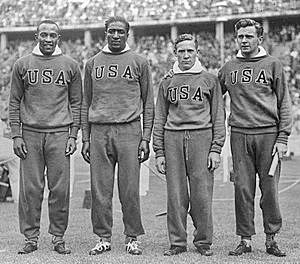
1936 – At the Berlin Olympics, African American track star Jesse Owens won his fourth gold medal of the Games in the 4×100-meter relay.
His relay team (including Owens, Ralph Metcalfe, Foy Draper, Frank Wykoff … L-R in photo above) set a new world record of 39.8 seconds, which held for 20 years.
With their strong showing in track-and-field events, Owens and other African American athletes struck a propaganda blow against Nazi leader Adolf Hitler, who planned to use the Berlin Games as a showcase of supposed Aryan superiority.
But there was controversy, nonetheless.
It involved the benching of two American Jewish runners, Marty Glickman and Sam Stoller. Both had trained for the 4×100-meter relay, but on the day before the event, they were replaced by Owens and Metcalfe, the team’s two fastest sprinters.
Various reasons were given for the change. The coaches claimed they needed their fastest runners to win the race. Glickman said that Coach Dean Cromwell was motivated by antisemitism and the desire to spare Hitler the embarrassing sight of two American Jews on the winning podium.
“We were shocked. Sam was completely stunned. He didn’t say a word in the meeting. Jesse spoke up and said ‘Coach, I’ve won my 3 gold medals [the 100, the 200, and the long jump]. I’m tired. I’ve had it. Let Marty and Sam run, they deserve it.’
“And Cromwell pointed his finger at him and said ‘You’ll do as you’re told.’
“In those days, black athletes did as they were told, and Jesse was quiet after that.”
~Marty Glickman
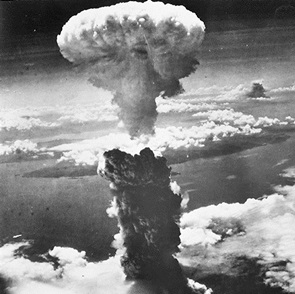
1945 – The devastation wrought at Hiroshima three days earlier was not sufficient to convince the Japanese War Council to accept the Potsdam Conference demand for unconditional surrender, so a second atomic bomb was dropped on Japan – this time in Nagasaki – by the United States, resulting finally in Japan’s surrender.
The explosion unleashed the equivalent force of 22,000 tons of TNT. The number killed is estimated at anywhere between 60,000 and 80,000.
Exact figures are impossible because the blast obliterated bodies and disintegrated records.

1969 – Shortly after midnight, members of Charles Manson’s cult killed five people at movie director Roman Polanski’s Beverly Hills home.
The victims were Polanski’s pregnant wife, actress Sharon Tate, noted hairstylist Jay Sebring, coffee heiress Abigail Folger, screenwriter Wojciech Frykowski, and 18-year-old Steven Parent, who had been visiting the property’s caretaker.
The following evening, the group killed again, murdering supermarket executive Leno LaBianca and his wife Rosemary in their home.
The savage crimes shocked the nation and, strangely, turned Charles Manson into a criminal icon.
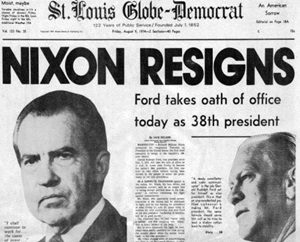
1974 – Richard M. Nixon stepped down from the presidency of the United States and was succeeded by Vice President Gerald R. Ford.
Nixon resigned rather than face almost certain impeachment because of the Watergate scandal, in which he was charged with misuse of presidential powers to violate the constitutional rights of U.S. citizens, obstruction of justice, and failure to respond to House Judiciary Committee subpoenas.
After taking the oath of office, President Ford spoke to the nation in a television address, declaring, “My fellow Americans, our long national nightmare is over.”

1976 – Hurricane Belle, a Category 3 storm, approached the North American mainland, with winds reaching 111 miles per hour.
It seemed headed for a direct hit on the Outer Banks of North Carolina, but skirted the region as it weakened to a Category 2. Still, even this glancing blow caused severe flooding and erosion in the resort communities on the Outer Banks.
Belle then moved northeast along the coastline. In Atlantic City, New Jersey, the world-famous boardwalk suffered $1 million in damages. Hundreds of thousands of people lost electrical power in New Jersey.
As Belle weakened to a tropical storm on August 10, it hit Long Island. Again, hundreds of thousands lost power and the region was later declared a federal disaster area. The following day, Belle struck Connecticut, wiping out a large apple harvest. The storm then moved north to Vermont. There, torrential rains caused by Belle caused flash flooding and the deaths of two more people.
By the time Belle had run its course, the storm had killed 12 people and caused $24 million in damages.

1995 – Jerry Garcia’s long, strange trip came to an end when he died of a heart attack in a residential drug-treatment facility in Forest Knolls, CA.
Like his band, the Grateful Dead, which was still going strong three decades after its formation, Garcia defied his life-expectancy not merely by surviving, but by thriving creatively and commercially into the 1990s – far longer than most of his peers.
A legendary guitarist and true cultural icon, Jerry Garcia was 53 years old.

2001 – President George W. Bush introduced a ban on federal funding for research on newly created human embryonic stem cell lines.
The policy was intended as a compromise and specified that research on lines created prior to that date would still be eligible for funding. Seventy-one lines from 14 laboratories across the globe met Bush’s eligibility criteria, and scientists who wished to investigate these lines could still receive grants through the National Institutes of Health.
In practice, however, only 21 lines proved to be of any use to investigators.
On March 9, 2009, President Barack Obama signed an Executive order revoking the previous orders initiated under his predecessor.
The new policy allowed federally funded researchers to experiment on hundreds of viable cell lines restricted under Bush. By 2016, the Obama administration funded research on 369 embryonic-stem-cell lines, and new stem-cell lines were added to the list of those eligible for federal funding.
In 2019, President Donald Trump announced that government scientists at the National Institutes of Health would no longer be allowed to conduct research using human fetal tissue.
Ongoing external fetal-tissue projects receiving NIH funding would be allowed to continue, but new applications or grant renewals from universities and research institutions would now be subject to an ethics advisory board review.
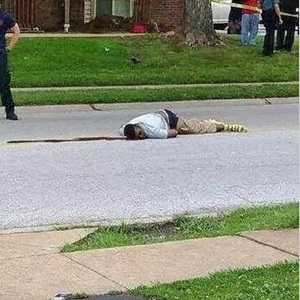
2014 – Michael Brown, an 18-year-old black man, was fatally shot by Darren Wilson, 28, a white Ferguson, MO police officer.
The disputed circumstances of the shooting of the unarmed man sparked existing tensions in the predominantly black city, where protests and civil unrest erupted.
The events received considerable attention in the U.S. and elsewhere, generating a national debate about the relationship between law enforcement and African Americans, and about police use of force doctrine in Missouri and nationwide.
On November 24, 2014, Robert McCulloch, the St. Louis County Prosecutor, announced the St. Louis County grand jury had decided not to indict Wilson.
On March 4, 2015, the U.S. Department of Justice reported the conclusion of its own investigation and cleared Wilson of civil rights violations in the shooting. It found forensic evidence supported the officer’s account, that witnesses who corroborated the officer’s account were credible, and that witnesses who had incriminated him were not credible, with some admitting they had not directly seen the events.
The U.S. Department of Justice concluded that Wilson shot Brown in self-defense.
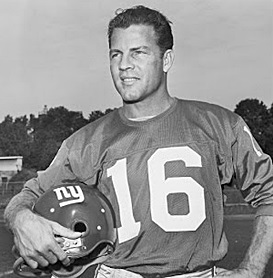
2015 – Frank Gifford died from natural causes at the age of 84.
Gifford spent 12 seasons with the New York Giants, making eight pro Bowl appearances and winning the MVP award in 1956. He was inducted into the Pro Football Hall of Fame in 1977.
After his playing days ended, Gifford became a commentator, mainly for NFL games on CBS. His big break came in 1971 when he replaced Keith Jackson as play-by-play announcer on ABC’s Monday Night Football, joining Howard Cosell and Don Meredith.
He would continue in that role until 1997.
Please Note…
Because August 10 was also filled with very significant events in history, there will be another “lesson” tomorrow.
Compiled by Ray Lemire ©2019 RayLemire.com. All Rights Reserved.